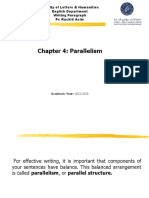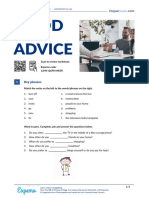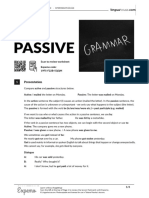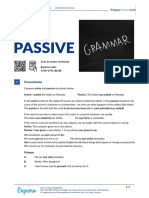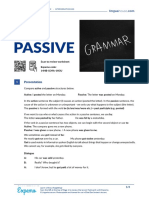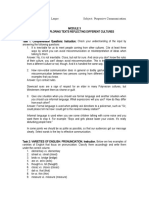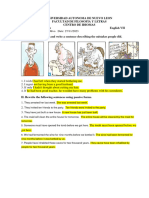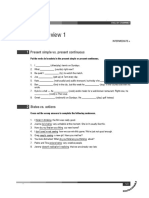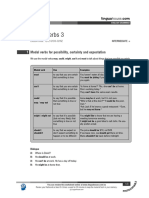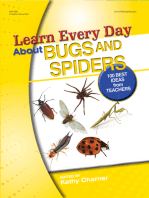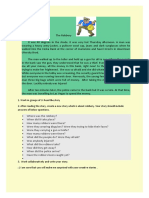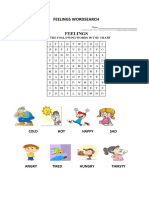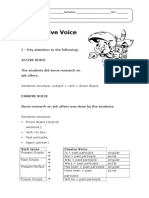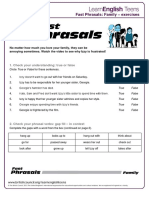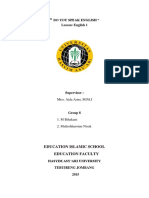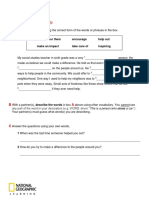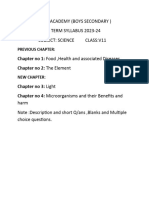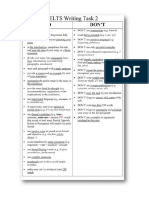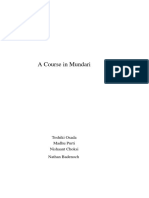Controversy PDF
Uploaded by
Vero NikaControversy PDF
Uploaded by
Vero NikaA A GENERAL ENGLISH
Controversy
Lesson code: 112R-H17F-2KV3 PRE-INTERMEDIATE
1 Warm-up
Is it a good idea to give money to beggars?
2 Key words
Match the underlined words to the correct definitions:
1. The government wants to ban smoking in public places.
2. The book is very controversial a lot of people disagree with the author's ideas.
3. He thanked them for their kindness and support.
4. She didn't believe me. She accused me of lying.
5. It's illegal to drive without a license.
a. against the law
b. causing a lot of angry disagreement
c. make illegal
d. said that someone did something bad or wrong
e. the act or quality of being friendly and generous
3 Reading
You are going to read an article about a proposal to ban begging in Norway. Decide if the following
statements are true (T) or false (F) and then read the text to check your answers.
1. Under the proposed law, people who offer money or food to beggars can go to prison for up to 2 years.
2. The government proposed the new law because there are too many beggars on the streets.
3. Norway's parliament started debating the ban on begging five years ago.
4. At the moment, begging is legal everywhere in Norway.
5. The new law is controversial.
6. Norway is Europe's richest country.
You can review this worksheet online at www.linguahouse.com/ex 1/4
Review your flashcards at least 3-5 times a week for 20 minutes to keep the material fresh in your memory.
c
Linguahouse.com
Controversy
A A A A GENERAL ENGLISH
Norway proposes to ban beggars and
people who try to help them
Norway's justice minister says the law is needed to stop people who run begging
networks as an `organized business'
1 Norway has proposed a controversial new law. If the new law becomes a reality, it will be illegal to
help beggars on the streets. If this happens, people who offer money or food to beggars can go to
prison for between six months to a year, and organized begging will become a crime.
2 City authorities in Oslo are angry about the proposal, but Norway's justice minister Anders Anundsen
said the law was needed to stop people who run begging networks as an "organized business".
3 Norway's parliament started debating the ban on begging last year, because of the high number of
beggars on the streets. Individual councils are already able to ban begging, but now the government
wants a nationwide ban.
4 Inger Husby, from Oslo, often invites homeless people into her house. She is afraid that her `kindness'
will become illegal if the proposal becomes a law.
5 "They have stayed here several times," she said. "I give them a packed lunch, and I fill their cups with
cocoa. I wash their clothes when they need it and they come for dinner from time to time."
6 Karin Andersen, a member of parliament for the Socialist Left Party, tweeted her anger at the proposal
and accused the government of criminalizing poor people.
7 "Europe's richest country criminalizes Europe's poorest people," she said.
Adapted from The Independent, by Roisin O'connor Wednesday, February 4th, 2015
4 Phrases from the text
Match the verbs on the left with the nouns and phrases on the right.
1. propose a. a law
2. go b. a reality
3. become c. for dinner
4. come d. money or food
5. offer e. to prison
Now make your own sentences using the above phrases.
You can review this worksheet online at www.linguahouse.com/ex 2/4
Review your flashcards at least 3-5 times a week for 20 minutes to keep the material fresh in your memory.
c
Linguahouse.com
Controversy
A A A A GENERAL ENGLISH
5 Find the word
Find a word in the text which means ...
1. manage (verb, SUBTITLE)
2. everywhere in the country (P3, adjective)
3. people who don't have a home (P4, phrase)
4. sent a message via Twitter (P6, verb in the past simple)
5. makes illegal (verb, P7)
6 Grammar - First conditional
Complete the sentences below from the text.
becomes can go happens becomes will be will become
1. If the new law becomes a reality, it illegal to help beggars on the streets.
2. If this , people who offer money or food to beggars to prison for
between six months to a year.
3. She is afraid that her `kindness' illegal if the proposal a law.
The above structure is called the first conditional. We use the first conditional to say what will happen in a
certain situation in the future. A first conditional sentence contains two halves:
If + present simple, will/can + verb
The negative uses don't and won't:
If the new law doesn't become a reality, it won't be illegal to help beggars on the streets.
Do not use will with if.
If I see him, I will tell him.
NOT: If I will see him, I will tell him.
7 Practice 1
Complete these first conditional sentences with the present simple or `will'. Only use contractions for
negatives - e.g. won't/don't.
1. If you (not/wake up) early, you will be late.
2. If I pass my exams, I (be) very happy.
3. You can go to bed early if you (finish) your homework on time.
4. If it rains tonight, I (not/go) out.
5. If you (drive) too fast, you will have an accident.
You can review this worksheet online at www.linguahouse.com/ex 3/4
Review your flashcards at least 3-5 times a week for 20 minutes to keep the material fresh in your memory.
c
Linguahouse.com
Controversy
A A A A GENERAL ENGLISH
6. Your dinner (get) cold if you wait too long.
7. I'll be asleep if you (call) me too late.
8. If you go outside without a sweater, you (get) ill.
9. If you (not/invite) him, he won't come.
10. If you eat too much chocolate, you (become) fat.
8 Practice 2
Look at the possible future situations below. Form a sentence with `if' for each one like in the example.
If it rains this weekend, I won't go out.
It will rain this weekend.
You will have a holiday next month.
You will get up earlier than usual tomorrow morning.
You will lose something important tomorrow.
You will speak English fluently in 5 years' time.
You won't go out this weekend.
You will move to another country.
You won't be hungry later.
You will eat too much.
You will be late for your next lesson.
You will go to bed later than usual tonight.
9 Talking point
Discuss any of the questions below:
1. What do you think of Norway's proposed law?
2. Is begging a problem in your country?
3. Are there any controversial laws in your country?
You can review this worksheet online at www.linguahouse.com/ex 4/4
Review your flashcards at least 3-5 times a week for 20 minutes to keep the material fresh in your memory.
c
Linguahouse.com
You might also like
- Outcomes 2. Outcomes - Pre-Int - Vocabulary - Builder 2nd100% (2)Outcomes 2. Outcomes - Pre-Int - Vocabulary - Builder 2nd145 pages
- Natalia Pomorska - Unit 6 TEST 6 FOOD PRNo ratings yetNatalia Pomorska - Unit 6 TEST 6 FOOD PR5 pages
- Using The Simple Present To Express Future Time100% (1)Using The Simple Present To Express Future Time15 pages
- Pre-Intermediate II Exercise 5 - Word FormationNo ratings yetPre-Intermediate II Exercise 5 - Word Formation4 pages
- modal-verbs-3-possibility-and-expectation-british-english-teacher-bwNo ratings yetmodal-verbs-3-possibility-and-expectation-british-english-teacher-bw4 pages
- Crime and Punishment: Classify The CrimesNo ratings yetCrime and Punishment: Classify The Crimes4 pages
- Learning Activity 4 Evidence: Consolidation Activity Stage 1: The Wonder Years A. What To Do?No ratings yetLearning Activity 4 Evidence: Consolidation Activity Stage 1: The Wonder Years A. What To Do?7 pages
- Teaching Guide on Determiners Singular Plural Noun FinalNo ratings yetTeaching Guide on Determiners Singular Plural Noun Final9 pages
- The Passive British English Teacher B1 B2No ratings yetThe Passive British English Teacher B1 B24 pages
- 1 Match The Questions With The Correct ResponsesNo ratings yet1 Match The Questions With The Correct Responses7 pages
- Burn Down Look Forward Put On Get Over Kept Up Try OnNo ratings yetBurn Down Look Forward Put On Get Over Kept Up Try On2 pages
- Seminar 3 Psycholinguistics Practical Part 1. Study The Hypotheses Below and Carry Out ExperimentsNo ratings yetSeminar 3 Psycholinguistics Practical Part 1. Study The Hypotheses Below and Carry Out Experiments3 pages
- Trinity Test 1 Time Allowed: 3 Hours: Célpont Alapítvány WWW - Angolnyelvtanitas.huNo ratings yetTrinity Test 1 Time Allowed: 3 Hours: Célpont Alapítvány WWW - Angolnyelvtanitas.hu6 pages
- Class 3 - Summer Holiday Homework 2023-24No ratings yetClass 3 - Summer Holiday Homework 2023-2420 pages
- Tense Review 1: Present Simple vs. Present ContinuousNo ratings yetTense Review 1: Present Simple vs. Present Continuous4 pages
- Modal Verbs 3 Possibility and ExpectationNo ratings yetModal Verbs 3 Possibility and Expectation4 pages
- Dokumen - Tips - English For Ethiopia United States Agency For Pdfusaidgovpdfdocs For EthiopiaNo ratings yetDokumen - Tips - English For Ethiopia United States Agency For Pdfusaidgovpdfdocs For Ethiopia130 pages
- Evidence - Consolidation - Activity - Mayra Muñoz 5No ratings yetEvidence - Consolidation - Activity - Mayra Muñoz 56 pages
- Week 2 Monday Worksheet 1 Correct The Following ErrorsNo ratings yetWeek 2 Monday Worksheet 1 Correct The Following Errors8 pages
- Pre Intermediate English Review 3 Units 25 35 American English StudentNo ratings yetPre Intermediate English Review 3 Units 25 35 American English Student9 pages
- Handouts: Speaking (Vstep) Week 1: Handouts Tiếng Anh B1No ratings yetHandouts: Speaking (Vstep) Week 1: Handouts Tiếng Anh B15 pages
- Learning Activity 4 Evidence: Consolidation Activity Stage 1: The Wonder Years A. What To Do?No ratings yetLearning Activity 4 Evidence: Consolidation Activity Stage 1: The Wonder Years A. What To Do?6 pages
- Read The Following Passage Carefully Then Answer The Questions That FollowNo ratings yetRead The Following Passage Carefully Then Answer The Questions That Follow10 pages
- 16 Kinds Of Snow, Or How And Why Bilinguals Do It BetterFrom Everand16 Kinds Of Snow, Or How And Why Bilinguals Do It BetterNo ratings yet
- Learn Every Day About Bugs and Spiders: 100 Best Ideas from TeachersFrom EverandLearn Every Day About Bugs and Spiders: 100 Best Ideas from TeachersNo ratings yet
- Places-In-Town-And-Prepositions - 53669 PataciNo ratings yetPlaces-In-Town-And-Prepositions - 53669 Pataci2 pages
- Expressing The Future: Present Simple Present ContinuousNo ratings yetExpressing The Future: Present Simple Present Continuous1 page
- What Has He Done/ Hasn't Done?: Student ANo ratings yetWhat Has He Done/ Hasn't Done?: Student A5 pages
- Exercise 2. Simple Past / Present Perfect / Past PerfectNo ratings yetExercise 2. Simple Past / Present Perfect / Past Perfect2 pages
- Explorers 2 Unit 1 Feelings Wordsearch Picture Dictionaries Wordsearches - 91063No ratings yetExplorers 2 Unit 1 Feelings Wordsearch Picture Dictionaries Wordsearches - 910631 page
- The Passive Voice: I - Pay Attention To The Following: Active VoiceNo ratings yetThe Passive Voice: I - Pay Attention To The Following: Active Voice3 pages
- Do You Speak English " Lesson: English 1: Education Islamic School Education FacultyNo ratings yetDo You Speak English " Lesson: English 1: Education Islamic School Education Faculty6 pages
- Complete The Chart With The English Tenses: Structure and Use. Add ExamplesNo ratings yetComplete The Chart With The English Tenses: Structure and Use. Add Examples5 pages
- Guide 1 Activity 1. Read This Newspaper Article and Complete The Tasks BelowNo ratings yetGuide 1 Activity 1. Read This Newspaper Article and Complete The Tasks Below3 pages
- Present Perfect Tense Additional Material - Student CopyNo ratings yetPresent Perfect Tense Additional Material - Student Copy5 pages
- The Alphabet: Row 1 Row 2 Row 3 Row 4 Row 5 Row 6 Row 7 Row 8No ratings yetThe Alphabet: Row 1 Row 2 Row 3 Row 4 Row 5 Row 6 Row 7 Row 815 pages
- 76 - GE - English Grammar Revision - Exercise 33.No ratings yet76 - GE - English Grammar Revision - Exercise 33.6 pages










